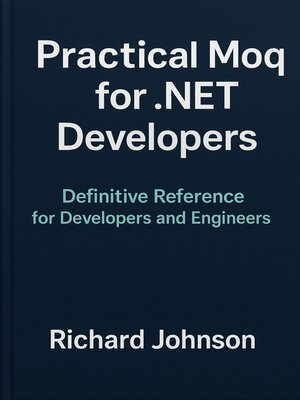Practical Moq for .NET Developers
ebook ∣ Definitive Reference for Developers and Engineers
By Richard Johnson

Sign up to save your library
With an OverDrive account, you can save your favorite libraries for at-a-glance information about availability. Find out more about OverDrive accounts.
Find this title in Libby, the library reading app by OverDrive.



Search for a digital library with this title
Title found at these libraries:
| Library Name | Distance |
|---|---|
| Loading... |
"Practical Moq for .NET Developers"
Practical Moq for .NET Developers is a comprehensive, in-depth guide designed for professional software engineers and testers seeking to master effective and maintainable unit testing in the .NET ecosystem. Beginning with core principles of unit testing and the pivotal role of mocking frameworks, the book unravels the theory and practicalities behind test doubles, isolation frameworks, and Moq's unique approach to simplifying Test-Driven Development. Readers will benefit from pragmatic advice on CI/CD integration, identifying and avoiding mocking anti-patterns, and understanding where mocking fits into modern enterprise development workflows.
With detailed coverage of Moq's internal architecture and expressive API, this book offers step-by-step instruction on advanced mocking scenarios—ranging from configuring strict, loose, and partial mocks to handling asynchronous code, event simulation, and complex object graphs. The reader will gain hands-on expertise in configuring and verifying mocks, leveraging LINQ for sophisticated setup patterns, and overcoming the technical challenges of testing static, sealed, or non-virtual members. Each chapter is rich with real-world examples, best practices, and tips for scaling Moq's capabilities across distributed systems, microservices, and large-scale ASP.NET Core applications.
Beyond core mechanics, Practical Moq for .NET Developers articulates the nuances of building stable, high-quality test suites—offering proven patterns for test organization, documentation, fixture management, and reusable setup logic. Attention is given to performance optimization, parallel test execution in enterprise environments, and seamless integration with popular test frameworks such as xUnit, MSTest, and NUnit. The book concludes with essential troubleshooting strategies, advanced extensibility techniques, and a forward-looking view on the evolution of .NET mocking, ensuring readers are equipped for both today's development landscape and tomorrow's innovation.







